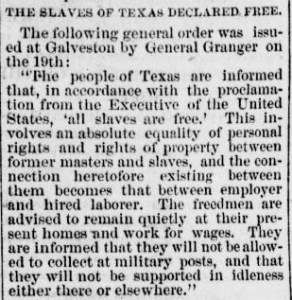
The Juneteenth holiday, one of the oldest Emancipation Day celebrations in the United States, commemorates the events of June 18 and 19, 1865, when Union General Gordon Granger and 2,000 federal troops arrived in Galveston, Texas, took possession of the state and declared all enslaved people in Texas free.
Although Lincoln’s Emancipation Proclamation had been issued in 1863, it had little effect on Confederate states, where African Americans continued to live in slavery until the war’s end.
On June 19, 1865, Granger read the contents of “General Order No. 3” to crowds assembled at Galveston’s Ashton Villa:
The people of Texas are informed that, in accordance with a proclamation from the Executive of the United States, all slaves are free. This involves an absolute equality of personal rights and rights of property between former masters and slaves, and the connection heretofore existing between them becomes that between employer and hired labor. The freedmen are advised to remain quietly at their present homes and work for wages. They are informed that they will not be allowed to collect at military posts and that they will not be supported in idleness either there or elsewhere.
Following Granger’s reading of General Order No. 3, former slaves in Galveston celebrated joyously in the streets. This day, and the holiday commemorating it, have come to be known as Juneteenth, a blending of the month (June) and the day (nineteenth) enslaved ancestors were freed in Galveston.
Juneteenth commemorations were held in Texas one year later, and the commemoration has since grown to national significance [1].
Here at Lowcountry Africana, we have an annual tradition of celebrating 7 Days of Juneteenth ~ each day for 7 days leading up to June 19, we roll up newly-digitized records made in the first days of freedom. Lowcountry Africana Co-Director Alana Thevenet and Senior Editor William Durant have been indexing records since January for this year’s celebration!
We begin with 1868 voter registrations for Beaufort, SC, and a Freedmen’s Bureau register of rations issued to elderly and infirm in the Moncks Corner Subdistrict, which encompassed many of the plantations in Berkeley District along the Cooper River corridor.
The 1868 voter registrations offer the rare opportunity to locate newly-freed ancestors prior to the 1870 US Census. The Freedmen’s Bureau rations list names hundreds of ancestors who were ages of 50 and upward in 1867, by plantation, for 112 plantations in the Moncks Corner Subdistrict. We hope you find an ancestors among them.
Many thanks to Alana and William for their hard work in indexing these new records!
7 Days of Juneteenth, Day 1:
Happy Ancestor Hunting from the crew at Lowcountry Africana!
References Cited
[1] “Juneteenth,” Wikipedia.com, http://en.wikipedia.org/wiki/Juneteenth, accessed June 13, 2013.
[2] “The Slaves of Texas Declared Free,” Norfolk Post, 11 Jul 1864, Page 2. Chronicling America, Database Online at Library of Congress, http://chroniclingamerica.loc.gov/lccn/sn85038624/1865-07-11/ed-1/seq-2/#date1=1865&index=6&date2=1865&searchType=advanced&language=&sequence=0&lccn=sn85038624&words=slaves+Texas+TEXAS&proxdistance=5&rows=20&ortext=&proxtext=&phrasetext=&andtext=Texas+Slaves&dateFilterType=yearRange&page=1, accessed June 13, 2013.







